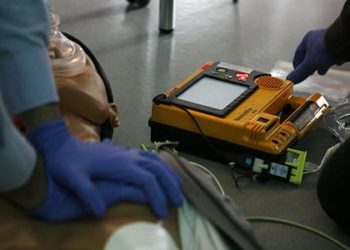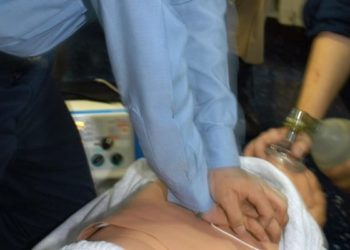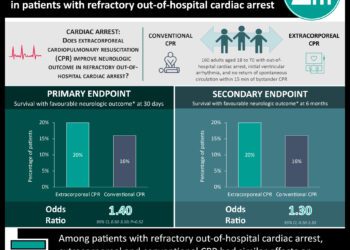Metronome use linked to rate optimization in pediatric CPR
1. The use of a metronome during simulated pediatric cardiopulmonary resuscitation (CPR) significantly improved the accuracy of the rate of compressions, in some study populations, delivered to a manikin.
2. Significant improvements in adequate compression rates were seen in medical students rotating in pediatrics, pediatric residents and fellows, but not in pediatric nurses.
Study Rundown: It is estimated that only 5-10% of children survive out-of-hospital cardiac arrests and poor-quality CPR has been noted to contribute to this outcome. The use of metronome-guided chest compressions in adult patients has been shown to be beneficial to the delivery of an adequate rate, but it is unknown if this method aids in pediatric cases. Authors of the current study sought to examine the effect of metronome use on the compression rate and depth during CPR in pediatric care providers. Overall, researchers found that metronome use improved the rate of compressions but did not affect the amount that were given at an acceptable depth. It was also seen that this method improved the adequate compression rate in medical students, pediatric residents, and fellows, but not among pediatric nurses. This study may be limited as real code situations cannot be simulated, participants were not instructed to pause for ventilations, feedback was obtained, and fatigue was not assessed. Nevertheless, the results should encourage future investigation of the use of metronomes in the pediatric population and stricter adherence to the American Heart Association guidelines.
Click to read the study, published today in Pediatrics
Relevant Reading: Pediatric cardiopulmonary resuscitation: advances in science, techniques, and outcomes
In-Depth [crossover study]: A total of 155 pediatric residents, fellows, nurses, and medical students were included in this study. All participants were certified with a minimum of basic life support training. Included professionals were blinded to the purpose of the study and randomized to complete 2 rounds of CPR on a manikin (one with an audible metronome and the other without). The manikin measured rate, depth, hand position, release time, and downstroke/upstroke ratio of delivered compressions. When using the metronome, the mean percentage of compressions delivered within an adequate rate was significantly improved (72% vs. 50%; 95% CI 15-29%). There was no significant difference seen in the mean percentage of compressions given within the acceptable depth (72% vs. 70%; CI -2-6%). The percentage of adequate compression rate was significantly improved in medical students (73% vs. 55%; CI 8-28%) and pediatric residents/fellows (84% vs. 48%; CI 27-46%), but not in nurses (46% vs. 48%; CI -19-14%) when using the metronome.
Image: PD
©2015 2 Minute Medicine, Inc. All rights reserved. No works may be reproduced without expressed written consent from 2 Minute Medicine, Inc. Inquire about licensing here. No article should be construed as medical advice and is not intended as such by the authors or by 2 Minute Medicine, Inc.






![Paracetamol (Tylenol) ineffective for low-back pain [PACE Study]](https://www.2minutemedicine.com/wp-content/uploads/2014/07/479px-Extra_Strength_Tylenol_and_Tylenol_PM-75x75.jpg)
![Adverse pregnancy outcomes associated with thrombophilias [Classics Series]](https://www.2minutemedicine.com/wp-content/uploads/2015/07/Classics-2-Minute-Medicine-e1436017941513-75x75.png)